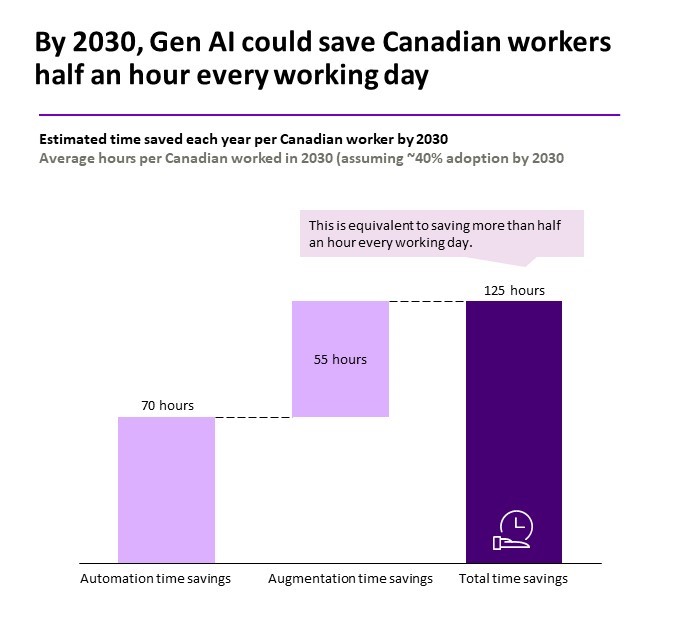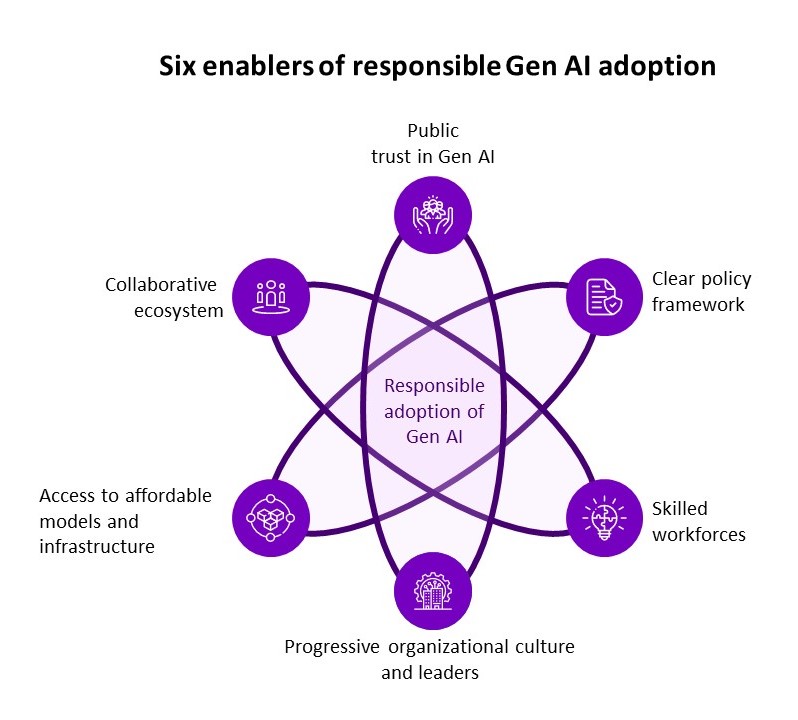Byline by Chris Barry, President, Microsoft Canada
A new report from Microsoft, conducted by Accenture, launching today reveals that Generative AI (Gen AI) could add a whopping $180B annually to the Canadian economy in labour productivity gains by 2030 and save workers 125 hours per year, equivalent to a half-hour saved each workday. Seizing this opportunity, will help us gain ground on Canada’s persistent productivity challenges and enhance Canada’s competitive position globally. Since 2015, Canada’s productivity has grown by only 0.6%. If Canadian organizations take advantage of the AI era, we can charge Canada’s labour productivity by an astounding 8%. These are huge potential economic gains, but we need to act quickly to adopt Gen AI or Canada risks falling further behind.
Key Report Findings: Generative AI’s Potential in Canada
The report reveals several important findings that underscore the potential for Gen AI to drive significant value to Canadians. The $187B economic projection is comprised of these key findings:
- Generative AI could generate up to $180 billion annually by 2030 in productivity gains.
- Gen AI has the potential to boost labour productivity by saving Canadian workers up to 125 hours a year—equivalent to half an hour every working day—resulting in an 8% increase in productivity by 2030.
- Generative AI is estimated to add $7 billion through the creation of new Gen AI products and services.
- SMEs stand to benefit significantly from Gen AI, with potential economic value reaching up to $100 billion by 2030. Since 99.7% of all Canadian employers are SMEs, they are understandably critical to the Canadian economy. In fact, around 50% of Canadian GDP is generated by SMEs.
- Key challenges to broad adoption of Gen AI include increasing public trust.
The Generative AI Landscape in Canada
The good news is that Gen AI is already making its mark in the Canadian economy, creating value across various sectors and industries. The report showcases some of the ways that Gen AI is enabling major growth opportunities across Canada’s core industries, for example:
Healthcare:
- Enable more one on one patient care
- Reduce time spent on administrative tasks
- Enhance personalized treatment and care plans
- Provide a more accurate view of a patient’s medical history
- Enable proactive healthcare models by allowing earlier diagnosis.
Government:
- Reduce red tape and improve the delivery of government services
- Make online platforms easier to navigate
- Respond to citizen inquiries and requests faster
- Accelerate application processing
Financial Services:
- Enhance customer experiences
- Improve risk management
- Drive operational efficiencies with the use of conversational AI assistants, automation, anomaly detection and data analytics
Natural Resources:
- Predict machinery repairs
- Optimize resource extraction and processing
- Enhance environmental monitoring
- Support safer field operations with augmented reality and robotics
Responsible adoption is key to unlocking the potential economic benefits of Gen AI
Canada has made progress in addressing barriers to Gen AI adoption through initiatives such as the Pan-Canadian AI Strategy, the introduction of the Artificial Intelligence and Data Act (AIDA), the development of a voluntary code of conduct for advanced generative AI systems and the recently announced Canadian AI Safety Institute. These steps aim to ensure that AI is adopted responsibly while unlocking its potential economic benefits. Globally, governments and businesses are also taking action to guide the development and deployment of Generative AI through regulatory, industry-led and multi-stakeholder efforts.
However, Canada lags its OECD peers in AI adoption. And only 9% of Canadian businesses are using Gen AI. At the same time, public trust in AI is low: only 31% of Canadians trust AI, 23 percentage points lower than the global average.
To keep advancing Gen AI adoption and achieve its benefits, Canada needs to build on its existing foundational leadership. The Accenture and Microsoft report identifies six enablers that will support the responsible adoption of Gen AI across sectors. It also outlines the immediate actions that government and industry leaders can take to ensure the enablers for responsible adoption are well supported.
- Public awareness and trust in Gen AI: The public needs to know how Gen AI affects them and trusts its positive outcomes.
- Clear policy framework: Rules that protect and guide those who create, use and benefit from Gen AI, while allowing for innovation.
- Skilled and adaptable workforces: Workers who can adopt, use and develop Gen AI.
- Innovative culture and leadership: A culture that embraces experimentation and innovation; leaders who understand the benefits, costs and risks of Gen AI adoption.
- Affordable models and infrastructure: Inexpensive and accessible Gen AI models and infrastructure for various organizations (incl. SMEs).
- Collaborative ecosystem: Strong partnerships across sectors and borders within Canada and with other nations.
Microsoft has long been at the forefront of AI, building on years of research to create powerful tools that meet the needs of people and organizations of all types now and in the future – with responsibility in mind. Our long-term partnership with OpenAI has helped speed up AI breakthroughs to make sure these benefits are broadly shared with the world. Moreover, with the general availability of our Azure OpenAI Service, we have made it possible for more organizations to apply the capabilities of the world’s most advanced AI models with their own data and spur new AI-powered applications that meet Microsoft’s Responsible AI Standard.
We also recognize that as technology advances, we need to make sure we have control over AI to pursue its benefits. We are dedicated to guiding the responsible development and deployment of AI, sharing what we’ve learned and supporting the work ahead. Last year, we released a five-point approach for addressing current and emerging AI issues through public policy, law and regulation. This includes implementing and building upon new government-led AI safety rules, requiring safety breaks, creating a wider legal and regulatory framework, increasing transparency and creating new public-private partnerships. By sharing the AI governance system within Microsoft, we hope to help governance advance more quickly and contribute constructively to the future.
Looking Ahead
The report emphasizes the urgency of Canada’s need to speed up AI adoption to remain competitive on the global stage, and sharing recommendations on how we can move forward. At Microsoft, we are committed to supporting Canada’s SMEs and enterprise businesses in their AI transformation journey. By working together with stakeholders across the country, we can help drive responsible AI adoption, boost economic productivity and ultimately improve the quality of life for all Canadians.








